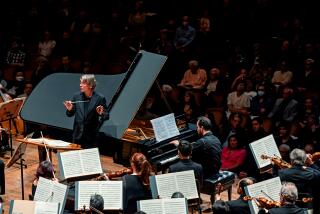A Comprehensive Tribute to Yehudi Menuhin at 75
Yehudi Menuhin has been appearing in public for nearly 68 of his recently achieved 75 years, having made his debut as a violinist in Oakland, across the Bay from his native San Francisco, in 1924 at the age of 7.
Performances throughout the world, inevitably triumphant, followed in short order until 1927, when he slowed his performing pace somewhat for a period of intensive study and career guidance in Paris under the Romanian-born violinist, conductor and composer Georges Enesco.
Just what young Yehudi sounded like from the late 1920s to the late ‘30s--when recordings didn’t lie--is documented in a trio of mid-priced EMI/Angel reissues, transferred with surpassing skill from 78s by EMI’s recently retired refurbishing wizard, Keith Hardwick, and his apprentice, Peter Bown.
In a Mozart program (63834), we first meet the curly haired youngster in 1929, when he was 13, playing (with pianist Hubert Giesen) the slow movement of the Sonata in C, K. 296, rather noncommittally and with surprisingly imprecise intonation.
The remainder of the program is another matter altogether. His first complete Mozart sonata recording (1933), the work in A, K. 526, with his sister Hephzibah an assertive, supportive piano partner, has tremendous drive and vivacity. The Sonata in F, K. 376, also with Hephzibah (1938), is equally stylish and vital. Also included is the Concerto in D, K. 218, with Menuhin beefily backed by the Liverpool Philharmonic conducted by Malcolm Sargent.
Another nominal Mozart program (63718) presents the Concerto in G, K. 216, and two works since proven spurious (which hardly detracts from their charm but has, alas, relegated them to the scrapheap): K. 271a and K. Anh. 294, both in the key of D.
In these recordings, dating from 1932 and 1935, Enesco conducts the first two works, Pierre Monteux the last, each providing the ideal complement to solo playing that is lively, unaffected and technically commanding without drawing undue attention to that aspect of Menuhin’s artistry.
The young violinist’s Classical leanings (or should we simply call it taste and intelligence?) are present as well in early recordings of Romantic repertory, the concertos of Mendelssohn and Dvorak (63834) with French orchestras authoritatively conducted by Enesco.
This 1938 Mendelssohn remains the most graceful and articulate of Menuhin’s several recordings of the concerto, and the 1936 Dvorak is a model of conjoined fire, lyricism and technical aplomb.
How depressing, then, to turn to the five-disc boxed set (EMI/Angel 63984, mid-price) that seems willfully to document the post-World War II decline of Menuhin’s technique.
There is one splendid entry. Significantly, it is the earliest: the Nielsen Concerto, recorded in 1952, with the Danish State Radio Symphony under Mogens Woldike. There are moments of intense beauty too in the Bloch Concerto dating from 1963, with the Philharmonia Orchestra under Paul Kletzki.
Most of the remainder is embarrassing, including a “Worst of Menuhin” collection: chamber music by Brahms, Schubert, Ravel and Debussy that shows the tone at its most awkwardly tremulous and raspy.
And there’s an entire Bartok disc in which the sentiment is touching but the conducting, by Antal Dorati and Pierre Boulez, is so idiomatically apt that it makes the soloist’s wheezing mechanics and insecure rhythm all the more painfully evident.
Laudatory press comments over the years regarding Menuhin’s playing of Bartok’s Viola Concerto (a 1966 recording) could only be the product of misguided ears under the impression that the viola need not be played with as firm a grasp of its technical requirements--or its repertory--as the violin.
Much of this “tribute” is unnecessary and certainly ill-chosen. It would have been infinitely wiser to take the best of what is here--the Nielsen and Bloch concertos--and offer it on a single CD. Then too it seems downright perverse for EMI not to have included in its boxed set the stunning Menuhin-led Brahms Sextet, Opus 18, dating from 1964.
Let’s recall Menuhin the young violinist with wonder and delight, and admire him for his later-years--indeed his current--accomplishments as a conductor, educator and champion of human rights.
More to Read
The biggest entertainment stories
Get our big stories about Hollywood, film, television, music, arts, culture and more right in your inbox as soon as they publish.
You may occasionally receive promotional content from the Los Angeles Times.










